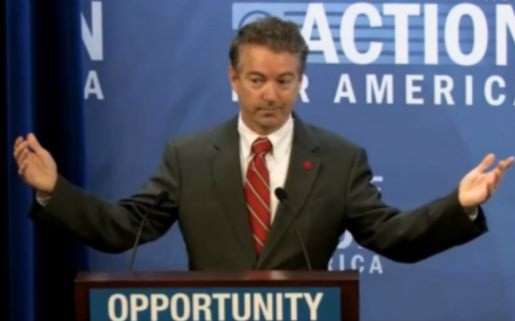Rand Paul, a 'Judicial Activist' in January, Is Now a Populist Judge Basher
The Kentucky senator faults courts for failing to reflect the majority's will.

Since Rand Paul is expected to launch his presidential campaign tomorrow, admirers of his libertarian-leaning positions should steel themselves for more backpedaling. A pre-announcement interview with The Federalist gives us a taste of the disappointment to come. Here is how Paul responds to a softball question about the role of courts in defending economic liberty:
You've talked about your unique view of judicial activism recently. Should the federal government and the courts have a role in fighting against state/local government policies, like professional licensing, that harm entrepreneurship and economic mobility, particularly among the poor?
I believe we should leave more power in the hands of the states and local governments. More often than not, the longer a federal judge or elected official is in office, the more out of touch they become. That is why I am a big proponent of term limits for elected officials and federal judges. Like with politicians, as each term passes, judges appear to grow more and more distant from the American people. We are seeing far too many judges make subjective or biased rulings, as opposed to constitutional ones. I believe it is time for us to term-limit out-of-control, unelected federal judges.
The question alludes to Paul's recent comments about judicial activism. As Damon Root noted here, the Kentucky senator rejected the school of conservative legal thinking that tells judges to err on the side of deference to majority rule. Paul said judges should not hesitate to override the decisions of democratically elected legislators when those decisions violate constitutional rights. "I'm a judicial activist when it comes to Lochner," he said in a speech at the Heritage Action Conservative Policy Summit in January. "I'm a judicial activist when it comes to the New Deal. But I'm also a judicial activist when it comes to Brown [v. Board of Education]. I think the [Supreme Court] was right to overturn state governments that were saying 'separate but equal' is fine."
That was a pretty bold stance, bound to provoke objections from progressives as well as conservatives, and it provided evidence that Paul would bring a different and interesting perspective to the race for the Republican presidential nomination. Three months later, Paul the libertarian judicial activist has been replaced by Paul the populist judge basher, demanding judges who do the majority's bidding and defer to state and local governments instead of overturning laws they determine to be unconstitutional. That is a pretty dramatic shift in tone and emphasis, if not in legal philosophy, and it looks like blatant pandering to Republican primary voters.
No doubt Paul would say the "out-of-control, unelected federal judges" he has in mind make decisions based on their own policy preferences instead of the Constitution. But the question he was answering referred specifically to rulings defending economic liberty, possibly based on the 14th Amendment's moribund Privileges or Immunities Clause. It was an opportunity for Paul to expound on his view of appropriate judicial activism. Instead he used it as an excuse for a cheap shot at judges who dare to second-guess the work of legislators.


Show Comments (32)